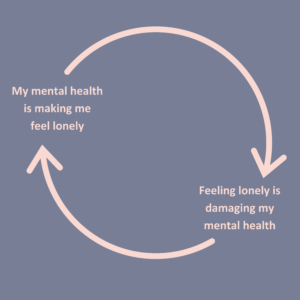The Mental Health Foundation has announced that this year’s Mental Health Awareness week will take place from Monday 9th May – Sunday 15th May with loneliness and its effect on our mental health being the theme throughout.
The Foundation’s Mental Health in the Pandemic research found that loneliness has been worsened by the Covid-19 pandemic. So, across this week we encourage you to build meaningful connections with your friends, family, and colleagues.
Loneliness in the UK
Loneliness affects millions of people in the UK every year and can be both the drive for and a product of poor mental health.
The pandemic has given rise to a sense of loneliness and isolation undermining confidence in daily routines. Over the last couple of years, many of us have had far less access to loved ones. Technology and changes in society along with convenience and cost efficiencies are driving more and more activities online with less need for human interaction.
Our workplaces are also changing. With many individuals’ adapting to home and hybrid working, we need to embrace this change while building and maintaining meaningful connections with our colleagues.
Loneliness and mental health
We all feel lonely from time to time. Feelings of loneliness are personal, so everyone’s experience will be different.

One common description of loneliness is the feeling we get when our need for rewarding social contact and relationships is not met. But loneliness is not always the same as being alone.
You may choose to be alone and live happily without much contact with other people, while others may find this a lonely experience. Or you may have lots of social contact or be in a relationship or part of a family, and still feel lonely – especially if you don’t feel understood or cared for by the people around you.
Feeling lonely isn’t in itself a mental health problem, but the two are strongly linked. Having a mental health problem can increase your chance of feeling lonely and feeling lonely can increase the risk of mental health problems such as depression, anxiety, low self-esteem, and stress if experienced over a long period of time.
Tips to manage loneliness
Make your alone time meaningful
If you don’t enjoy your own company very much, this could be a struggle initially, but one that gets easier with practice.
Instead of focusing on the fact that you’re alone, make your alone time meaningful and focus on self-love.
Think about the things that really make you feel good and use your alone time to do these. It could be anything from taking a walk outside, having a pamper evening, re-organising your kitchen or cooking yourself a three-course meal.
The more you use your alone time to do the things you love, the more you will begin to appreciate and look forward to these moments.
Make new connections or nurture existing ones
If you’re feeling lonely because of a lack of satisfying social contact in your live, you could try to meet more, or different people.
Consider joining a class or group based on your hobbies or interest, or if you can, volunteering is a good way of meeting people.
If you’re feeling lonely because you don’t spend enough time with your existing connections, reach out and arrange to meet for a coffee or even for a catch up over the phone! Life gets busy and it’s easy to slip into the rut of feeling like people don’t care if they don’t reach out. But remember, that’s very unlikely to be the case and is more so that they have had to focus on their own responsibilities.
Try to open up
You might feel that you know plenty of people, but what is actually wrong is that you don’t feel close to them, or they don’t give you the care and attention that you need.
In this situation it might be helpful to open up about how you feel to friends and family. If you don’t feel comfortable opening up to the people you know, you could try speaking with a therapist or using a peer to peer support service – see if your workplace EAP provider offers signposting to talking therapies and CBT!












